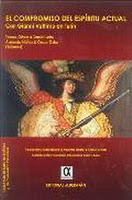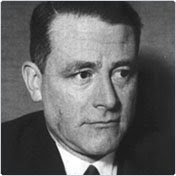John Morgan - What Guénon and Evola Really Meant by Tradition (...and Why Many Get it Wrong)
There is a great
deal of confusion about what Guénon and Evola meant by Tradition, and while the
terms "traditional" or "traditionalist" are frequently
invoked these days, often the evocateur demonstrates in said usage that he does
not in fact grasp it. I offer some quotes from Guénon for clarification.
Guénon on the
difference between philosophy, in the modern sense, and Tradition (from
"Crisis in the Modern World"):
"It is true
that the word 'philosophy' can, in itself, be understood in quite a legitimate
sense, and one which without doubt originally belonged to it, especially if it
be true that Pythagoras himself was the first to use it: etymologically it
denotes nothing other than 'love of wisdom'; in the first place, therefore, it
implies the initial disposition required for the attainment of wisdom, and, by
a quite natural extension of this meaning, the quest that is born from this same
disposition and that must lead to knowledge. It denotes therefore a preliminary
and preparatory stage, a step as it were in the direction of wisdom or a degree
corresponding to a lower level of wisdom; the perversion that ensued consisted
in taking this transitional stage for an end in itself and in seeking to
substitute 'philosophy' for wisdom, a process which implied forgetting or
ignoring the true nature of the latter. It was in this way that there arose
what may be described as 'profane' philosophy, in other words, a pretended
wisdom that was purely human and therefore entirely of the rational order, and
that took the place of the true, traditional, supra-rational, and 'non-human'
wisdom. However, there still remained something of this true wisdom throughout
the whole of antiquity, as is proven primarily by the persistence of the
'mysteries', whose essentially initiatic character is beyond dispute; and it is
also true that the teachings of the philosophers themselves usually had both an
'exoteric' and an 'esoteric' side, the latter leaving open the possibility of
connection with a higher point of view, which in fact made itself
clearly-though perhaps in some respects incompletely-apparent some centuries
later among the Alexandrians. For 'profane' philosophy to be definitively
constituted as such, it was necessary for exoterism alone to remain and for all
esoterism simply to be denied, and it is precisely this that the movement
inaugurated by the Greeks was to lead to in the modern world. The tendencies that
found expression among the Greeks had to be pushed to the extreme, the undue
importance given to rational thought had to grow even greater, before men could
arrive at 'rationalism', a specifically modern attitude that consists in not
merely ignoring, but expressly denying, everything of a supra-rational
order."
This indicates
that Tradition cannot be understood via the means of modern, rationalistic
philosophy, and that modern philosophy must always be seen as ultimately
incomplete.As for lower-t
tradition versus Tradition, one must understand that the former has absolutely
nothing to do with the notion of Tradition, which is rooted in the esoteric,
not the social or historical - even if there is a relationship. The social
world is exoteric, and therefore the least important aspect of Tradition.
From
"Introduction to the Study of the Hindu Doctrines":
“We have
constantly had occasion to speak of tradition, of traditional doctrines or
conceptions, and even of traditional languages, and this is really unavoidable
when trying to describe the essential characteristics of Eastern thought in all
its modalities; but what, to be exact, is tradition? To obviate one possible
misunderstanding, let it be said from the outset that we do not take the word
“tradition” in the restricted sense sometimes given to it by Western religious
thought, when it opposes “tradition” to the written word, using the former of
these two terms exclusively for something that has been the object of oral
transmission alone. On the contrary, for us tradition, taken in a much more
general sense, may be written as well as oral, though it must usually, if not
always, have been oral originally. In the present state of things, however,
tradition, whether it be religious in form or otherwise, consists everywhere of
two complementary branches, written and oral, and we have no hesitation in
speaking of “traditional writings”, which would obviously be contradictory if
one only gave to the word “tradition” its more specialized meaning; besides,
etymologically, tradition simply means “that which is transmitted” in some way
or other. In addition, it is necessary to include in tradition, as secondary
and derived elements that are nonetheless important for the purpose of forming
a complete picture, the whole series of institutions of various kinds which
find their principle in the traditional doctrine itself.
Looked at in
this way, tradition may appear to be indistinguishable from civilization
itself, which according to certain sociologists consists of “the whole body of
techniques, institutions, and beliefs common to a group of men during a certain
time”; but how much exactly is this definition worth? In truth, we do not think
that civilization can be characterized generally by a formula of this type,
which will always be either too comprehensive or too narrow in some respects,
with the risk that elements common to all civilizations will be omitted or else
that elements belonging to certain particular civilizations only will be
included. Thus the preceding definition takes no account of the essentially
intellectual element to be found in every civilization, for that is something
that cannot be made to fit into the category known as “techniques”, which, as
we are told, comprises “those classes of practices specially designed to modify
the physical environment”; on the other hand, when these sociologists speak of
“beliefs”, adding moreover that the word must be “taken in its usual sense”,
they are referring to something that clearly presupposes the presence of the
religious viewpoint, which is really confined to certain civilizations only and
is not to be found in others. It was in order to avoid all difficulties of this
kind that we were content at the start simply to describe a civilization as the
product and expression of a certain mental outlook common to a more or less
widespread group of men, thus making it possible to treat each particular case
separately as regards the exact determination of its constituent elements.
However that may
be, it remains nonetheless true, as far as the East is concerned, that the
identification of tradition with the entire civilization is fundamentally
justifiable. Every Eastern civilization, taken as a whole, may be seen to be
essentially traditional. . . . As for Western civilization, we have shown that
it is on the contrary devoid of any traditional character, with the exception
of the religious element, which alone has retained it. Social institutions, to
be considered traditional, must be effectively attached in their principle to a
doctrine that is itself traditional, whether it be metaphysical or religious or
of any other conceivable kind. In other words, those institutions are
traditional that find their ultimate justification in their more or less
direct, but always intentional and conscious, dependence upon a doctrine which,
as regards its fundamental nature, is in every case of an intellectual order;
but this intellectuality may be found either in a pure state, in cases where
one is dealing with an entirely metaphysical doctrine, or else it may be found
mingled with other heterogeneous elements, as in the case of the religious or
other special modes which a traditional doctrine is capable of assuming. [...]
In Islam
tradition exists under two distinct aspects, one of which is religious—it is
upon this aspect that the general body of social institutions is
dependent—while the other aspect, which is purely Eastern, is wholly
metaphysical. In a certain measure something of the same sort existed in
medieval Europe in the case of the Scholastic doctrine, in which Arab
influences moreover made themselves felt to an appreciable extent; but in order
not to push the analogy too far it should be added that metaphysics was never
sufficiently clearly distinguished from theology, that is to say from its
special application to the religious mode of thought; moreover, the genuinely
metaphysical portion to be found in it is incomplete and remains subject to
certain limitations that seem inherent in the whole of Western intellectuality;
doubtless these two imperfections should be looked upon as resulting from the
double heritage of the Jewish and the Greek mentalities.
In India we are
in the presence of a tradition that is purely metaphysical in its essence; to
it are attached, as so many dependent extensions, the diverse applications to
which it gives rise, whether in certain secondary branches of the doctrine
itself, such as that relating to cosmology, or in the social order, which is
moreover strictly governed by the analogical correspondence linking together
cosmic existence and human existence. A fact that stands out much more clearly
here than in the Islamic tradition, chiefly owing to the absence of the
religious point of view and of certain extra-intellectual elements that
religion necessarily implies, is the complete subordination of the various
particular orders relative to metaphysics, that is to say relative to the realm
of universal principles.
In China, [there
is ] the sharp division . . . [between] a metaphysical tradition on the one
hand and a social tradition on the other, and these may at first sight appear
not only distinct, as in fact they are, but even relatively independent of one
another, all the more so since the metaphysical tradition always remained
well-nigh exclusively the appanage of an intellectual elite, whereas the social
tradition, by reason of its very nature, imposed itself upon all without
distinction and claimed their effective participation in an equal degree. It
is, however, important to remember that the metaphysical tradition, as
constituted under the form of “Taoism”, is a development from the principles of
a more primordial tradition, formulated in the I Ching, and it is from this
primordial tradition that the whole of the social institutions commonly known under
the name of “Confucianism” are entirely derived, though less directly and then
only as an application to a contingent sphere. Thus the essential continuity
between the two principal aspects of the Far-Eastern civilization is
re-established, and their true relationship made clear; but this continuity
would almost inevitably be missed if it were not possible to trace them back to
their common source, that is to say to the primordial tradition of which the
ideographical expression, as fixed from the time of Fu Hsi onward, has been
preserved intact for almost fifty centuries."
Therefore, there
can be a relationship between small-t tradition and Tradition, but the latter
is not dependent on the former - rather, it is the other way around. The reason
Guénon did not see the modern West as a genuine civilization is because,
according to the traditionalists, there is no longer a connection between
tradition and Tradition. This should highlight the problem inherent in those
who use the term "traditionalist," invoking Evola and/or Guénon but
who clearly have no grasp of this, and use it however they fancy, and also why
tradition isn't exactly irrelevant to an understanding of Tradition, but is
certainly woefully incomplete on its own. I offer this note as an attempt to
clarify the usage of this term.





































0 comentarios:
Publicar un comentario